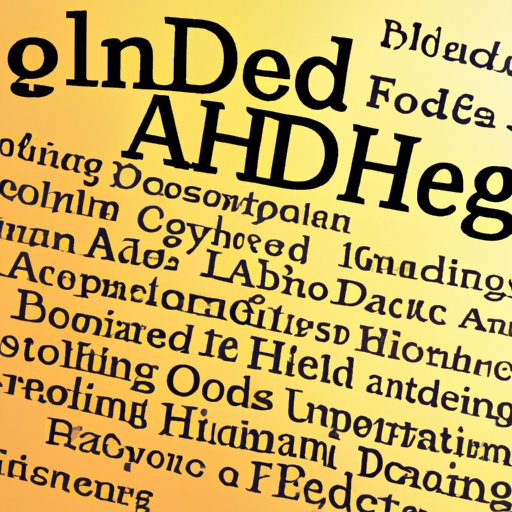
Can You Develop ADHD Later in Life?
Attention-Deficit/Hyperactivity Disorder (ADHD) is often associated with childhood, but recent research suggest that many adults may struggle with undiagnosed ADHD. This has led to an increased demand for information on the onset of ADHD in adulthood and ways to manage the condition. If you’re wondering whether it’s possible to develop ADHD later in life, this article will explore the science behind this possibility, the symptoms, and ways to manage it, including how to overcome the challenges of living with it, and breaking the stigma surrounding it.
The Science Behind Developing ADHD Later in Life
The causes of ADHD aren’t fully known, but more research has helped to better understand the neurological and environmental factors that contribute to ADHD. The current understanding is that certain factors in early childhood could set the stage for the onset of ADHD later in life. Genetic and neuropsychological factors, stemming from a variety of genes that regulate dopamine receptors, can also contribute to the onset of ADHD in adulthood. Environmental factors such as low birth weight, prenatal exposure to substances like cigarettes and alcohol, and inflammation from infections can also contribute to the onset of ADHD later in life.
Research studies on ADHD show that the symptoms may not become apparent in adults until situations arise that put more pressure on the individual’s cognitive function or attention, such as significant life changes like marriage, divorce, or career changes. People who have experienced traumatic events, stress, or anxiety may also develop ADHD as adults later in life. Additionally, certain age-related factors, such as age-related cognitive decline or hormonal changes, may also contribute to the onset of ADHD-like symptoms in adults.
Recognizing the Symptoms of Late-Onset ADHD
The symptoms of ADHD in adults can present differently than the symptoms of children, which can make it difficult for adults to recognize that they may be experiencing ADHD-like symptoms. Common symptoms of adult ADHD include frequent forgetfulness, disorganization, the inability to complete tasks and meet deadlines, working slowly, easily losing track of things and details, impulsiveness, hyperactivity (especially among female adults with ADHD), and difficulty in staying focused.
Many of these symptoms may be mistaken for either other conditions that share similar symptoms, or simply the effects of an overly busy lifestyle. This is why it’s important to consult a healthcare professional if you suspect that you have ADHD symptoms or have difficulty completing daily tasks.
Why More Adults are Being Diagnosed with ADHD
The number of adults diagnosed with ADHD is increasing as a result of improved diagnostic tools and wider social awareness of the condition. Advances in neuropsychological testing can help to detect ADHD in adults, and help establish diagnoses. Also, unlike children, ADHD in adults isn’t easily recognizable because it often co-occurs with other mental health illnesses and complications, such as substance abuse and addiction.
The wider awareness of ADHD also makes it easier for adults to recognize and identify their symptoms, as well as find resources and support that can be helpful in addressing their struggles.
Managing ADHD Symptoms Later in Life
Managing adult ADHD can be challenging, but there are lifestyle changes, strategies, and techniques that can help make life more manageable. Behavioral therapy, cognitive therapy, medication, and inattention training are all options for those with adult ADHD. Coaching and mentoring can also be useful, as they can help to improve time management and organizational skills, coping with the emotional and work-related struggles that come with ADHD. Regular exercise, a consistent sleep schedule, and a healthy diet can also help mitigate the effects of ADHD and improve overall health.
Breaking the Stigma of Late-Onset ADHD
Many adults can feel stigmatized even after they are diagnosed with ADHD later in life, as people often associate the condition with children. The condition can also be perceived as a “people problem” rather than a legitimate neurological disorder. Understanding and education on ADHD is one way to break this stigma and help individuals contextualize their struggles as valid. Community forums, medical professionals’ advice, and ADHD organizations could offer support groups, also offer valuable resources and emotional support for those who may feel stigmatized by their diagnoses.
Overcoming the Challenges of Living with Late-Onset ADHD
Living with late-onset ADHD can present many challenges, but there is hope. A thriving community of adults with ADHD offers many opportunities for support and guidance. Online support groups, community groups, and peer-to-peer support can offer valuable advice on how to overcome daily struggles. Many individuals with ADHD have become successful in a wide range of fields, like business, sports, and entertainment.
Conclusion
ADHD is a neurological condition that can affect adults who may have struggled with the symptoms but were never diagnosed with the condition. The symptoms may arise during adulthood due to neurological and environmental factors. Though every person may experience this condition differently, lifestyle changes and healthy habits can ease the negative effects of ADHD. The first step in managing late-onset ADHD is understanding the symptoms of the condition, recognizing when they manifest in your daily life, and seeking necessary diagnosis and support. This, coupled with accessible and robust coping strategies, can enable individuals to overcome the challenges that living with ADHD later in life present and lead a fulfilling life.




